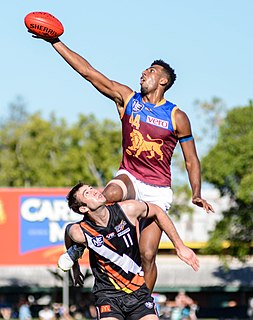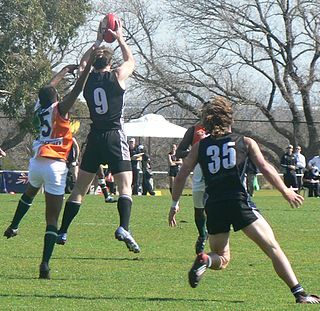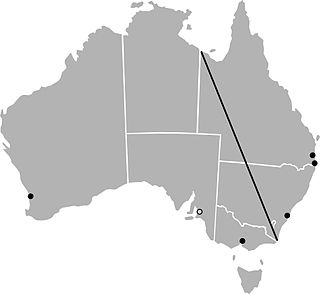
Australian rules football, also called Australian football or Aussie rules, or more simply football or footy, is a contact sport played between two teams of 18 players on an oval field, often a modified cricket ground. Points are scored by kicking the oval ball between the central goal posts, or between a central and outer post.
The Australian Football International Cup is a triennial international Australian rules football sport competition. It is the biggest worldwide tournament in the sport and is open to all nations. More than 26 nations have participated and the competition has expanded into multiple pools and both men and women's divisions. The most recent event 2020 was postponed and then cancelled due to the COVID-19 pandemic and subsequently postponed until 2024. At the time of the last tournament in 2017, the sport had a record 170,744 players outside Australia growing at a rate of 25% per annum.
The Australian Rules Football League of Ireland (ARFLI) is an Australian rules football competition and is the governing body of Australian Football in Ireland. Ireland is ranked the number three country in Australian football outside of Australia despite having a smaller league than some of its lower-ranked competitors. Ireland has been a competitor and finalist in all AFL International Cups and a winner twice. The success of the Irish team has commonly been attributed to the ease at which Gaelic footballers adapt to the Australian football because of certain similarities between the two codes.
Exhibition matches in Australian rules football have been used to promote the game as a demonstration sport outside of its heartlands in Australia.
Australian rules football is a sport played in many countries around the world at amateur level only. In 2016, about 106,000 people played in structured competitions outside of Australia and at least 20 leagues that are recognised by the game's governing body, exist outside Australia. In 2007 there was a total of 34,845 players. In contrast, there are over 800,000 players in Australia where the game is at its strongest; overseas players make up less than 2% of the total players worldwide.
The United States national Australian rules football team, nicknamed the Revolution, represents the United States of America in the sport of Australian rules football. The Revolution are named after the American Revolution and wear the colors of the American flag.

Malcolm Robert Michael is a Papua New Guinean-born former Australian rules footballer. He is notable for his successful professional career in the Australian Football League. In a career spanning 238 games and three clubs in two Australian states he is best known as a triple premiership full-back with the Brisbane Lions. Michael is recognised as being one of the best Queensland produced Australian rules footballers of all time, being named on the AFL Queensland Team of the 20th Century.

Australia has named a senior Australian Football team, known as the All-Australian team team since 1947. This team, however has never officially played an international Australian rules football match. This is primarily because the country is so strong in the sport.

Australian rules football in New Zealand was first introduced to New Zealand in the 1860s and the official name for the sport between 1890 and 1914 was Australasian Football in acknowledgement of New Zealand's participation. After a half century hiatus of organised competition, has grown rapidly as an amateur sport. Today there are more than five organised competitions located in various regions across the country including Auckland; Canterbury; Wellington; Waikato; Otago, Queenstown and a four-team national competition with a national draft has been contested at the North Harbour Stadium in Auckland since 2016. The national team, The Hawks, have competed against the AFL Academy and were crowned International champions in 2005.

Australian rules football in Papua New Guinea (PNG) is a developing team sport which was initially introduced by Australian servicemen during World War II. The governing body for the sport is the PNG Rules Football Council, with the development body being AFL PNG. The junior development version is known locally as Niukick.
Australian rules football in South Africa is a team sport which has been growing since 1997.

Australian rules football in New South Wales dates back to 1866 though organised competition has only been continuous since the 1880s. Several regions have developed into strongholds of Australian football, including Broken Hill near South Australia, and the Riverina and the South Coast near Victoria, although in the latter two areas Australian rules is still behind rugby league as the most popular sport. In other, more populous areas of New South Wales, including Sydney, rugby league has maintained a higher profile due mainly to a strong and long standing cultural rivalry with Victoria, and Australian football remains a minor sport in terms of popularity in these areas. According to Ausplay and the AFL it has the third highest number of players of any state or territory after the sport in Victoria and in Western Australia. The current governing body is AFL NSW/ACT established in 1999.

Australian rules football in Ireland began in 1999 when clubs were simultaneously formed in Dublin and Belfast, however awareness of the sport dates back to the first tours by Australian teams in late 1967 and the country subsequently became a source of players for professional leagues in Australia through the Irish Experiment.

Australian rules football is the most watched and attended sport and the second most participated code of football in Australia.

The 2006 AFL Grand Final was an Australian rules football game contested between the Sydney Swans and West Coast Eagles, held at the Melbourne Cricket Ground in Melbourne on 30 September 2006. It was the 110th annual grand final of the Australian Football League, staged to determine the premiers for the 2006 AFL season. The match, attended by 97,431 spectators, was won by West Coast by a margin of one point, marking the club's third premiership victory.

The "Barassi Line" is an imaginary line in Australia which divides areas where Australian rules football is the most popular football code from those where rugby league and rugby union dominate. It was first used by historian Ian Turner in his "1978 Ron Barassi Memorial Lecture". Crowd figures, media coverage, and participation rates are heavily skewed in favour of the dominant code on both sides of the line.
Michael Anthony Patrick Pyke is a Canadian retired dual-code football player, who was a professional Australian rules footballer with the Sydney Swans.
Variations of Australian rules football are games or activities based on or similar to the game of Australian rules football, in which the player uses common Australian rules football skills. They range in player numbers from 2 up to the minimum 38 required for a full Australian rules football.

The sport of Australian football has been called by a number of different names throughout its history. Since 1905, with the formation of the Australasian Football Council, the game has been called "Australian football". The name has been codified by the AFL Commission, as the game's name in the "Laws of Australian football". Historically, the sport has been referred to as "Victorian rules", the "Victorian game", "Australasian rules", the "Australian game" and "Australian national football", "national football", the "bouncing game" and, derisively, "aerial ping pong" as well as several other names. Today, the common names for the sport are "Australian Football" and "Australian rules football" and it is referred to as "football", "footy", "Aussie rules" or sometimes, mistakenly, as "AFL".











